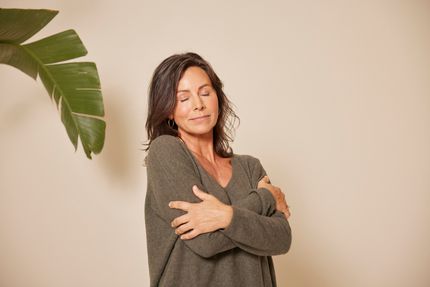Vaginal or labial burning and menopause
During and after menopause, 30 percent of women experience vaginal issues like irritation, pain or a burning sensation in the vagina or labia area. The culprit? Declining oestrogen levels brought on by menopause. What can you do about it? What products support vaginal health during menopause, and which ones are best to avoid?

Vaginal itching and burning was driving me crazy. Since I’ve stopped using products with irritants, I feel so much better. - Lisa (age 51)

Vaginal problems are a typical symptom of menopause. When levels of oestrogen go down, the walls of the vagina can become dry and more vulnerable. In many women, this triggers uncomfortable symptoms. As the level of oestrogen in your body is still relatively high during perimenopause, most women develop vaginal problems after menopause.
Research shows that vulvovaginal symptoms are common and present in over 50 percent of postmenopausal women. The older you are, the more susceptible you are to these symptoms. The most common complaint is vaginal dryness, but many women also experience other symptoms, such as vaginal itching, irritation and burning. Most women report that their symptoms affect how they feel, both physically and mentally, as well as their sex life.
What is happening in your body?
Oestrogen plays a crucial role in maintaining vaginal health. It keeps mucous membranes healthy, regulates blood flow in the vaginal wall (the lining of the vagina) and keeps vaginal tissue supple and lubricated. This is necessary to keep fungi and yeasts at bay and ensure the vagina secretes natural lubrication in response to sexual arousal.
As women age their ovaries gradually produce less and less oestrogen, which can result in vaginal issues. Loss of oestrogen can lead to decreased vaginal blood flow. The vaginal tissue may lose its elasticity and become drier and more prone to irritation. As a result, the lining of your vagina can become thinner, less stretchy and more sensitive. You may notice burning or soreness in your vagina or labia. Loss of oestrogen can also cause vaginal pain or itching.
Mind you, a burning sensation in the vagina or labia can also occur due to other factors, such as the use of irritating products, a contact allergy, bacterial infection, vaginal yeast infection, urinary tract infection or an STI. Whatever the cause, vaginal or labial burning does not go away on its own. It may need to be treated with medication, such as vaginal oestrogen. Sometimes, lifestyle adjustments are enough to provide relief.
While vaginal dryness is a common symptom, women may also experience other symptoms like hot flashes, sleep problems and mood swings.
What can you do?
Here are some tips that can help reduce vaginal burning:
- Avoid products that irritate the skin. The vagina is a self-cleaning canal. Products that claim to promote vaginal health often do the opposite: they harm or irritate the vaginal flora. Avoid using soap, vaginal douches, scented toilet paper and other cleansing products. Instead, wash your vulva or labia with water and a soft washcloth. It can also help to avoid tight clothes.
- Slow down: take your time during sex. Women going through menopause can still get wet when aroused, it only takes a bit longer. Don’t let this stop you from being intimate with your partner or lover. Sex and masturbation keep the mucous membranes moist and healthy. It also helps to use lubricants.
- Do pelvic floor exercises. Pelvic floor exercises help strengthen your pelvic floor and vaginal muscles. This reduces the risk of urinary incontinence and infection.
- Use Vaseline and/or a cold compress. Applying an ice pack or cold compress to the affected area can help reduce vaginal burning. Vaseline protects the fragile skin around your vagina.
- Use a hormone-free vaginal gel. A vaginal gel moisturises the skin and relieves burning, itching and pain. Apply the gel twice a day at the vaginal opening and to the insides of the labia. The gel provides instant relief and has no side effects.
- Consider using vaginal oestrogen or suppositories. A vaginal hormone cream (oestriol) or hormonal suppository (oestriol or oestradiol) treats vaginal symptoms locally without subjecting the rest of the body to high levels of hormones. Vaginal cream or suppositories can be used for an extended period of time, without any risks. You may experience a burning sensation during the first days of treatment. You can expect noticeable results after a few weeks and optimal results after two months of treatment. Use the cream or suppository once a day at bedtime for 14 days, then switch to twice a week.
Your path to a smooth menopause starts here
Get the tools you need to navigate menopause with more ease and to educate yourself about your body. With tips and insights from experts, and relatable stories of women just like you. Press play, not pause.
What treatments can help?
Vaginal or labial burning often stems from hormone shifts and declines experienced during the menopausal transition. Avoid using hygiene products that have perfumes. These products contribute to vaginal irritation. Also make time for foreplay and arousal. If the burning persists, you should talk to a doctor.
Can hormone therapy help?
Hormone replacement therapy (HRT) replaces the hormones a woman's body stops making due to menopause. HRT can be an effective way to treat severe symptoms, such as hot flashes and vaginal dryness. If you're experiencing severe symptoms besides labial burning, then HRT might be an option for you.
Sources
- NHS. (2024). Vulvodynia (vulval pain). https://www.nhs.uk/conditions/vulvodynia/
- Erekson, Elisabeth A. MD, MPH; Li, Fang-Yong MPH; Martin, Deanna K. MPH; Fried, Terri R. MD (2016). Vulvovaginal symptoms prevalence in postmenopausal women and relationship to other menopausal symptoms and pelvic floor disorders. https://journals.lww.com/menopausejournal/abstract/2016/04000/vulvovaginal_symptoms_prevalence_in_postmenopausal.5.aspx
- Seymour T, Redhead T. Medical News Today (2023). What causes burning in the vagina? https://www.medicalnewstoday.com/articles/321104#home-remedies
- NIH National Institute on Aging. (2021). Sex and Menopause: Treatment for Symptoms. https://www.nia.nih.gov/health/menopause/sex-and-menopause-treatment-symptoms
Tips and advice


FAQ
I have a burning sensation in my labia. What is going on?
Labial or vaginal burning can have a variety of causes. Understanding what is happening in your body can help you address the issue effectively. Vaginal burning is usually caused by inflammation (an infection). In women over 45, menopause may be the cause. See a doctor to identify the cause so that it can be treated accordingly.
What supplements can support my health during the menopausal transition?
What dietary supplements you should take depends on your situation. However, there are a few supplements that benefit all women going through menopause. These are magnesium, Vitamin D, omega-3 and a vitamin and mineral complex. Read more about supplements and menopause.












